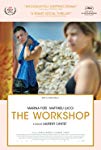Eye For Film >> Movies >> The Workshop (2017) Film Review
The Workshop
Reviewed by: Jennie Kermode

When we join the writing group at the centre of Laurent Cantet's film, they are learning the basics of narrative construction. We can assume that discussion of basic literary tools like metaphors has already taken place. Cantet, however, takes a back-to-basics approach in a film laden with them. We can assume that the students have already been encouraged to read the classics; Cantet's film owes a significant amount to Camus' The Stranger. Yet there's a potency to this film, largely thanks to a carefully judged performance by Marina Foïs as novelist and tutor Olivia, and a charismatic one by Matthieu Lucci as her most difficult student, Antoine.
Lucci, coming on like a young Marlon Brando, portrays Antoine as an angry young man who spends his spare time shooting guns out in the wasteland and watching online videos that talk about the importance of preserving French culture (without getting as far as Camus). In class, Antoine baits the other students, making misogynistic comments and equating Islam with terrorism. He's careful to stay just shy of language that cannot in some way be passed of as innocent or as legitimate discussion, but the volume of it speaks volumes - and as so often, it has the effect of shutting down other students' contributions. Olivia doesn't really know how to handle it. She's pleased to have a student who is so passionate and has so many ideas, and she exploits the situation to try and make a point about the importance of boundaries in art. It's telling that she expects her other students to put up with endless sniping but is quick to take action when her own work becomes Antoine's target.

As tutor and student become more obsessed with each other, a different kind of boundary-pushing begins. He starts spying on her outside class hours. She hacks into his computer. This situation is clearly heading for trouble. Cantet keeps the tension high even as he sidesteps to try and make a more literary point.
The central point here seems to be that liberal equivocation is no way to deal with fascism - or, at any rate, that it leaves the people at the sharp end undefended. Cantet keeps us guessing, wondering if Olivia will become a target for Antoine's barely repressed rage or if she will manage to channel him into some less destructive course. Neither of them really understands the other. He - like the other students - is from a depressed working class area, not really poor but with poor prospects. She lives in a luxury that's hard to imagine even a best-selling writer achieving (especially in light of the fact that she doesn't seem to do much work). His moral strategy is working for him; he doesn't want to be saved. The other students don't understand why she talks so much about intellectual rigour but can't understand what he's doing to the group. And of course he's unhappy, but the solution he needs is something quite different.
To viewers in the position of the students, much of what this film has to say will be glaringly obvious, yet it cannot be denied that Olivia is not the only one adept at missing what's right in front of her face. Neither is Antoine the only troubled youth frustrated by polite society's inability to grasp what he's feeling. One hopes, then, that this film will find an audience. It's simply yet elegantly shot and the central performances really are worth watching. And in its own way it is, in troubled times, a beacon of hope.
Reviewed on: 16 Nov 2018
















